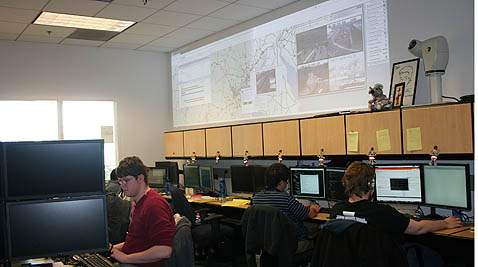WASHINGTON — A transportation system created by the Center for Advanced Transportation Technology Laboratory at the University of Maryland, College Park will be used during Monday’s Presidential Inauguration to monitor the area’s roads to help local and state agencies react quickly to any traffic problems.
The Regional Integrated Transportation Information System plots traffic data onto a map that includes a variety of information about accidents, parking, weather and mass transit updated in real-time. Regional traffic cameras are also linked to the system so that agencies can visually verify the extent of an accident. Public safety employees can access the online tool once they register and are approved.

Public safety agencies shared information with each other before RITIS launched, but this tool puts that information in a graphical form that helps the area’s jurisdictions understand what is going on in each area, according to Maryland State Highway Administration Spokesman David Buck.
RITIS is an “effective tool to make sure we know what everyone’s looking at,” Buck said.
These agencies can access RITIS for free, but the Department of Transportation provides funds for operations and maintenance costs, such as server maintenance and off-hour technical support.
Since 2009, the tool has expanded to include information on nearly every single road and arterial in the District, Maryland and Virginia. RITIS’s inaugural coverage has also switched from the four-dimensional map that FEMA used in 2009 to a 2-D map that allows users to more easily view the variety of data available.
This year’s inauguration won’t top the historic numbers from 2009, when 1.8 million people attended. The Associated Press quoted projections that 600,000 to 800,000 people will attend the inauguration on Monday.

It is important to reduce traffic delays and road closures, not only during events like the inauguration, but every day. “Time is money on the roadway,” CATT Lab Director Michael Pack said. “Every minute that a lane is blocked, the chances of another accident occurring goes up.
Data collected by RITIS is archived and may be used in the future by researchers to analyze traffic trends. CATT is developing tools that would allow agencies to make traffic predictions that could improve the way they prepare for regular traffic delays as well as for special events like the inaugural.
Pack and his team of students and full-time staff are working with a private company on tracking pedestrian traffic via cell phone signals, but are far from adding this feature to RITIS. Difficulty in distinguishing pedestrians from traffic and privacy concerns has prevented Pack from adding this feature in time for the inauguration.
A grant from the Urban Areas Security Initiative will help CATT launch a version of RITIS for the public. This version would include most of the features offered to current subscribers, such as traffic alerts for a favorite route sent as an e-mail or text message.


You must be logged in to post a comment.